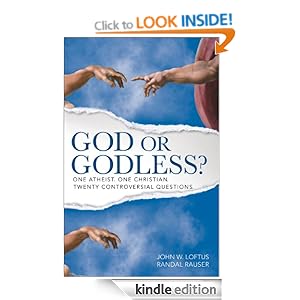I am stoked to have received a review copy of John Loftus’ latest offering, “God or Godless?” which he has co-written with Randal Rauser, the apologist with whom I had a radio debate on the subject of the nativity. Let me briefly introduce the authors and the book.
Rauser, the apologist with whom I had a radio debate on the subject of the nativity. Let me briefly introduce the authors and the book.
John Loftus, founder member of the Skeptic Ink Network (Debunking Christianity) has a bio as follows:
John W. Loftus is a former Christian minister and apologist with M.A., M.Div., and Th.M. degrees in Philosophy, Theology, and the Philosophy of Religion, the last of which was earned under William Lane Craig. He is the author of “Why I Became an Atheist: A Former Preacher Rejects Christianity,” and “The Outsider Test for Faith.” He edited “The Christian Delusion,” and “The End of Christianity.” He has also co-authored, with Dr. Randal Rauser, “God or Godless?”
Randal Rauser, his nemesis for the purposes of this book, has a bio as follows:
Randal Rauser is a systematic and analytic theologian of evangelical persuasion. He is driven by apologetic concerns and above all by the tireless pursuit of truth. The downside is that this requires him to recognize when he is wrong (which is often) for truth is complex and it offers us no guarantees that we shall always find it. At the same time, Randal does not despair of finding truth, for he believes that in a profound sense Jesus Christ is the truth.
For Randal, being like Jesus means knowing the truth, loving the truth, and living the truth. As Randal seeks to live the truth he promotes a culture of life that is anti-militaristic and pro-family, pro-environment and anti-abortion, anti-consumerist and pro-animal. A disciple on the way … alas, he is not half as smart or as good or as right as he thinks he is.
I am a broadly evangelical Christian, seminary professor, writer, husband, dad, Canadian, animal lover, and all around nice guy (or so people tell me, to my face anyway; behind my back I’m not so sure…).
The book is organised into twenty different mini-debates, with each writer taking it in turns to present an 800 word opening statement, a 200 word rebuttal and then a 50 word closing statement, such that each writer chooses 10 of there own arguments to present their case for atheism / theism.
What I like most about this book is that it is easy to read and not relatively short. I have a reading list as long as both my arms, so when there are quick and easily digestible books which cover a broad range of thoughtful and theological subjects, I am game. This book is one that can be picked up and put down, and then picked up again later with consummate ease. Moreover, it can be read out of order.
But that is not to say that the subject matter is light and airy. These are big ideas; big criticisms; deep ponderings. It is the best of both worlds. John talks about the book, amongst many other times, here. Randal talks about it here.
So far, I have enjoyably read through four chapters. Here is a list of the chapters as found on DC:
Who is this god and what did he command?
1) The biblical concept of god evolved from polytheism to monotheism.
2) The biblical god required human sacrifices for his pleasure.
3) The biblical god commanded genocide.God does not care:
4) God does not care much about slaves.
5) God does not care much about women.
6) God does not care much about animals.God is ignorant:
7) God is ignorant about science.
8) God is ignorant about the futureGod is incompetent:
9) God is an incompetent creator.
10) God is an incompetent redeemer.Randal’s proposed ten topics (i.e., canards) are:
1) If there is no God then life has no meaning
2) If there is no God then everything is permitted.
3) Science is no substitute for religion
4) God is the best explanation of the whole shebang
5) If there is no God then we don’t know anything (the argument from reason)
6) Atheism spoils Valentine’s Day (Argument against naturalistic views of love)
7) Everybody has faith, so why not make yours a reasonable one?
8) The Hallelujah Chorus. Period. (Argument from beauty)
9) God best explains the miracles in people’s lives
10) Jesus was resurrected, so who else do you think raised him?
I will keep you updated with regards to how I get on. I think my next post will centre on Randal Rauser’s position with regard to child sacrifice (Chapter 4).
If you wish to buy the book, please use a link below to give ATP a little commission!
US Amazon:
UK Amazon:
